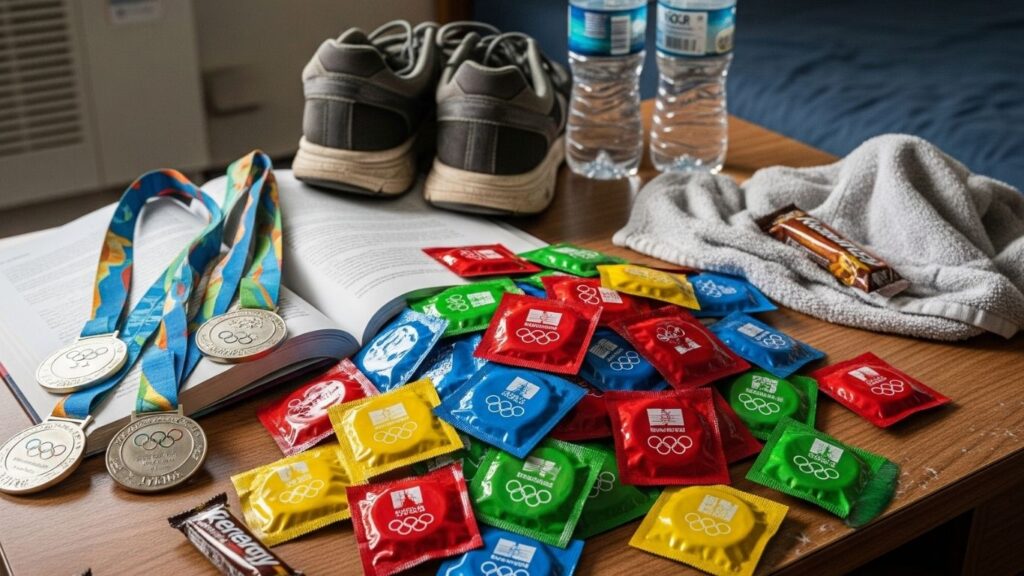From thousands of free condoms to candid Olympian confessions, the Games have always had a passionate side beyond the medals
New Delhi, August 16, 2025
Every four years, the Olympic Games showcase the best of human endurance, speed and strength. But behind the dazzling lights and medal ceremonies, there’s another story that rarely makes the headlines — the steamy, adrenaline-fuelled life inside the Olympic Village.
Athletes past and present admit that once the events are over, the Village transforms into a place where rules bend, desires surge and human impulses take over.
The Condom Legacy of the Olympics
The story goes back to 1988, when Seoul became the first Olympic host to distribute condoms among athletes, a move introduced during the AIDS crisis to encourage safe sex. Since then, it has become a tradition that grows bolder every edition.

Sydney 2000 began with 70,000 condoms — and had to rush-order 20,000 more when supplies vanished quickly. London 2012 stocked 150,000, while Rio 2016 broke all records with a jaw-dropping 450,000. Even Tokyo, under strict COVID-19 protocols, gave out 160,000. And at Paris 2024, nearly 300,000 were prepared, working out to an average of 23 condoms per athlete.
What Happens When the Races End
So why do the world’s most disciplined athletes let loose? German long jumper Susen Tiedtke , who competed in Barcelona 1992 and Sydney 2000, has a simple explanation. “At the Olympics, athletes are at their absolute physical peak,” she told Bild. “Once the competition is over, they want to release all that energy.”
Former U.S. water polo captain Tony Azevedo agreed, telling ESPN that the mix of pressure and proximity makes connections inevitable. “You’re suddenly surrounded by people just like you, who’ve trained for years and finally have time to breathe — and boom,” he said.
American soccer star Hope Solo once admitted that intimacy isn’t always behind closed doors. “I’ve seen people on the grass, between buildings… they just go for it,” she recalled to ESPN Magazine.
And then there’s swimmer Ryan Lochte , who claimed that up to “75 percent of Olympians” hook up during the Games .
Why Desire Peaks at the Olympics?
Experts say it’s not surprising. A report in Psychology Today explained that intense competition, shared experiences and constant proximity naturally spark attraction. Surveys suggest that about 10 percent of athletes have sex during the Games, while another 10 percent confess they would like to — but hold back due to personal reasons.
Dr. Virginia A. Sadock, psychiatrist at NYU , told Live Science: “When people are away from home, they feel free. Add the excitement, the physical appeal of athletes, and the need to escape stress — it’s the perfect recipe.”
The Myths of ‘Anti-Sex Beds’
Both Tokyo and Paris Games courted headlines for their so-called “anti-sex beds,” made of recyclable cardboard. But officials quickly dismissed the rumors, explaining the beds were chosen purely for environmental reasons, not as a chastity measure.
Also Read: Porn’s Juiciest Lies: 8 Myths That Turn to Dust in Real Life
Beyond Gold and Glory
Olympians train for years in isolation, often missing out on a normal social life. So, when they finally gather in one place, bursting with adrenaline and youth, the Village becomes more than just housing — it becomes a stage for human connection.
As skier Carrie Sheinberg once put it, the Olympic Village feels like “Alice in Wonderland, where everything is possible.”
And maybe that’s what makes the Games so special. Beyond the medals, world records and national pride, the Olympics remain a reminder that even the fittest, most disciplined athletes in the world are still human — with passions and desires that no stopwatch can measure.
Also Read: Brooklyn’s Most Talked-About Dessert Isn’t Vanilla… It’s ‘Breast Milk’




